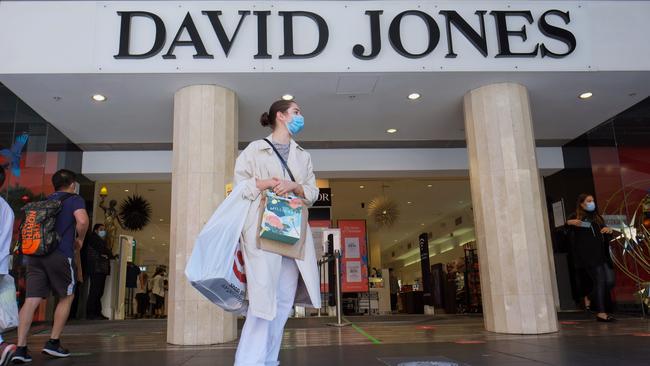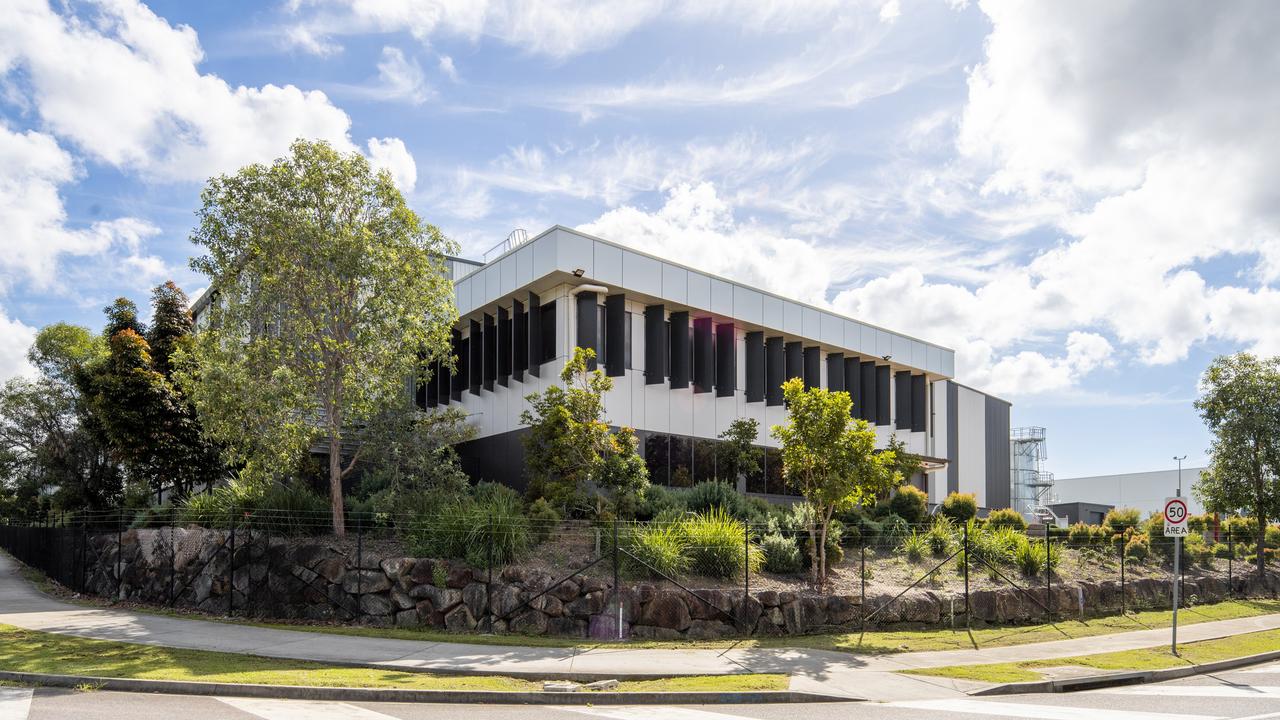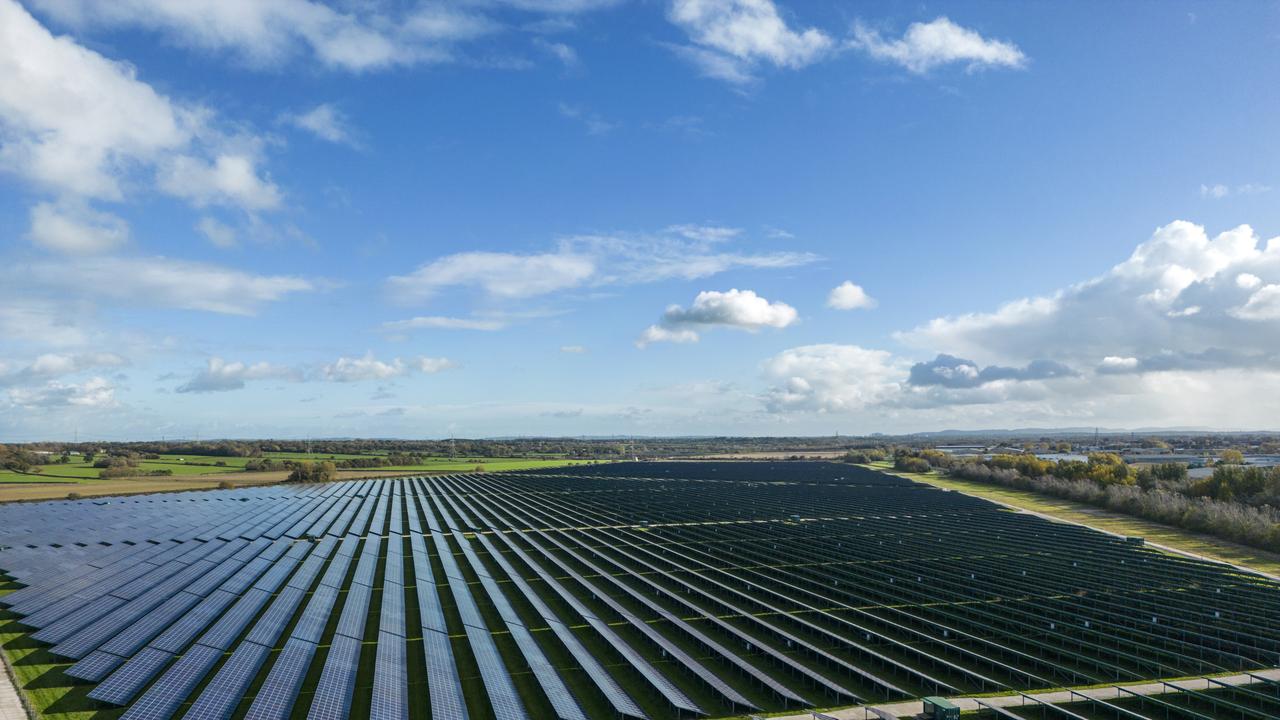David Jones is seeing a return to its stores and rising sales but faces inflationary pressures
David Jones will be forced to raise its prices this year as it faces inflationary pressure from its own brand suppliers and rising shipping and freight costs.

Business
Don't miss out on the headlines from Business. Followed categories will be added to My News.
David Jones will be forced to raise its prices this year as it faces inflationary pressure from its own brand suppliers and rising shipping and freight costs, adding the upmarket department store to a growing list of businesses warning of cost hikes this year.
Roy Bagattini, the boss of the South African company Woolworths Holdings that owns David Jones as well as the Country Road Group, said on Wednesday it had locked in contracts to maintain its pricing over the past year but as new stock came into its stores and new contracts were signed there would need to be price rises.
“We will (raise prices) over time. We have been able – through the way we secure our production and manage through the supply chain – to lock in a level of pricing.
“And that obviously plays through but with sustained inflationary pressures there will be … a pass through to our customer price at the end of the day.”
Mr Bagattini said price increases at his Australian retail stores would be pushed through this year, and although he wouldn’t nominate a percentage rise he thought would be needed to counter inflationary pressures, he said it would be minimal.
“We don’t think it would have a material effect on our (sales) volumes. We are appreciating the sensitivity of those price increases, but we don’t see that really materially impacting our plans around revenue.”
It comes as a number of retailers warn of price increases this year to tackle inflation within supply chains led by steeper shipping and freight charges, energy costs and labour shortages.
Last week Woolworths chief executive Brad Banducci warned his supermarkets were witnessing price rises of 2 to 3 per cent and said that inflation was a “live and real issue” in the economy.
Mr Bagattini’s comments come as David Jones’s profit slumped in the last six months of 2021, hurt by a raft of store closures during Covid, but the department store chain expects the strong fundamentals of the Australian economy and easing of restrictions to help lift consumer confidence.
Operating profit dropped by almost a half as 70 per cent of its stores were unable to trade for three months while pent up consumer demand helped give a strong uplift to sales six weeks out from Christmas.
Woolworths Holdings said global supply chain disruptions and high freight costs continued to pose a risk to both the cost and supply of product.
As Omicron restrictions wane there should be a return to foot traffic to its stores, and while there was the prospect of higher interest rates dampening spending, the strengths of a solid housing market, solid wages and low unemployment should help counter that.
Woolworths Holdings’ half-year results to December 26 showed David Jones’s adjusted operating profit of $31m was nearly 45 per cent down on the prior period.
Sales fell by 9.2 per cent, and by 9 per cent on a same store basis. However, sales did improve towards Christmas with David Jones’ sales up by 3.2 per cent in the last six weeks or 7.7 per cent higher adjusting for the shift in Boxing Day sales.
Online sales jumped by 44 per cent and contributed around 28 per cent to total sales.
Expenses declined by 1.8 per cent as a result of store closures, space reduction and cost-out initiatives, notwithstanding Covid-related government support and rent concessions in the previous period.
Adjusted operating profit dropped 49 per cent to $48m for the six months to December.
Country Road Group’s sales fell 3.1 per cent and by 3.2 per cent in comparable stores for the half. But they rose 1.7 per cent in the last six weeks of the period. Online sales increased by 3.6 per cent and contributed 34 per cent to total sales, while trading space reduced by 7.4 per cent.
In its commentary, Woolworths Holdings said its trade in Australia was significantly impacted by government-imposed Covid restrictions.
“The easing of restrictions and reopening of stores, coupled with pent-up consumer demand, delivered positive sales growth in the last six weeks of the period, notwithstanding the shift of Boxing Day sales into the second half of this financial year versus the first half of the prior period.”
It expected conditions to improve through the year although CBD-located stores would still be below where they were before Covid hit.
“In Australia, trading conditions are expected to improve post the Omicron peak at the beginning of the second half, as restrictions ease and consumer confidence recovers.
“Footfall in stores is also expected to improve, albeit that it is likely to remain below pre-Covid levels, particularly in CBD areas.”
Last year David Jones managed to break a three-year streak of losses to post its first net profit since 2018, as property sales, lease benefits and an end to the run of impairments that piled up to nearly $1bn helped it fight its way back into the black.
In August David Jones posted an almost fourfold increase in its annual earnings for 2021 despite its shuttered stores caused by Covid-19 lockdowns.
Recent accounts lodged with ASIC for Osiris Holdings, the local company that houses the David Jones business, showed a net profit of $83.45m for the 52 weeks to the end of June 2021, a turnaround from the loss of $125.9m in 2020.
It brings to an end a costly and painful run of losses for David Jones and its South African parent, which bought the retailer in 2014 for $2.1bn. The large loss in 2020 came on top of a $489.23m loss in 2019 and $785m in 2018.
Meanwhile, rival department store owner Myer will release its half-year results on March 10. In January Myer updated the market on its recent trading performance, advising total sales for the five months from August to the end of December rose 12.3 per cent compared to the previous corresponding period despite shops being closed for more days.
Myer said at the time that momentum had remained strong even in the last few months of calendar 2021 despite the worsening trading conditions and the arrival of the Omicron variant of the coronavirus.
More Coverage
Originally published as David Jones is seeing a return to its stores and rising sales but faces inflationary pressures





